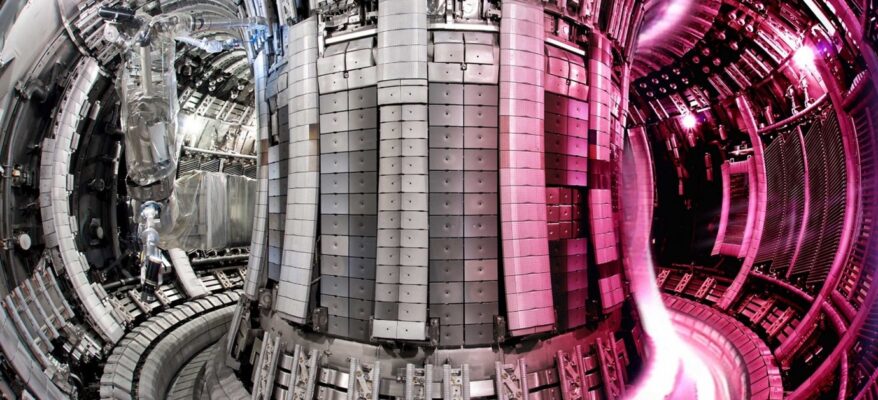RCNDE and UKAEA joint workshop on “Non-Destructive Evaluation for Fusion”
May 24, 2024 Comments (0) News
On 17th April, the UK Research Centre in Non-Destructive Evaluation and (RCNDE) and the UK Atomic Energy Authority (UKAEA) organised an “Non-Destructive Evaluation (NDE) for Fusion” Workshop at the Culham Science Centre in Oxfordshire. The event was held to create a greater understanding within the NDE community of the inspection requirements of this advanced form of energy production, both in the manufacturing and the operational stages of its life, and for the fusion developers to gain an appreciation of the range of NDE technologies that might offer potential solutions. The workshop attracted more than 50 attendees, covering the entire specturm from academia to industry and companies actively involved in fusion power generation.
When a mix of two types of hydrogen (deuterium and tritium) are heated to form a plasma at extreme temperatures (10 times hotter than the core of the sun) they fuse together to create helium and release huge amounts of energy. At UKAEA, this hot plasma is held using strong magnets in a ring-shaped machine called a ‘tokamak’. Nevertheless, the surface temperature at the walls can reach 2000°C, and radiation levels can be 3000 Gray/year, so this is an environment that necessitates advanced safety planning.
Presentations were made by Paul Goodwin and Yao Ren of UKAEA, Jim Pickles of Tokamak Energy Ltd. and Naresh Chityala of Commonwealth Fusion Systems who described the various designs and the range of problems that are anticipated. High amongst these are the advanced materials for the vessel and pipework systems, their connecting welds, and the extremely constrained access conditions. Creep, corrosion, embrittlement and neutron damage are all expected to be severe, but until a fusion system becomes operational it is not possible to estimate their initiation times and rates of growth. Instead, the approach is to ensure newly manufactured parts are as flaw-free as possible, and to plan on periodic replacement of the affected items throughout the life of the asset. Test samples containing representative flaws are clearly unavailable at present so traditional inspection validation routes are also problematic.
However, despite the undoubted challenges of fusion energy generation, the strength of NDE is that very often different industrial sectors have the same fundamental issues which can be tackled collectively. Once the groundwork has been completed, it is often just a matter of adapting the inspection method to a particular material, component or system. The afternoon of the Workshop showcased a variety of projects that have been undertaken by RCNDE that might, with further specific developments, be applicable to fusion systems:
Eann Patterson (University of Liverpool) described a cost-effective infra-red camera system for measuring the thermoelastic stresses in surfaces that face the plasma and their incorporation into a first-of-a-kind digital twin, while Matthew Riding (University of Strathclyde) explained the history of laser induced ultrasound (UKAEA were pioneers) and how this system could be used remotely to inspect through extremes of temperature. Ruth Sanderson of Full Matrix Ltd. outlined a system for inspecting long lengths of pipework using non-contact ultrasound produced by an array of EMATs. Distortion in the signals caused by bends and other surface features could be compensated for by modelling the configurations and utilising machine learning, thereby producing a greater sensitivity to small flaws at a great range.
The inspection of welds during their manufacture was described by Charles MacLeod (University of Strathclyde). This presentation illustrated that the effects of high temperatures and thermal gradients can be understood and compensated for to produce accurate information on flaw sizes and positions within welds. Anthony Croxford (University of Bristol) explained how WAND-Light can be used to measure wall thicknesses over many metres in a repeatable manner. Finally, Fred Cegla (Imperial College) reviewed a number of systems that have been installed on operational power plants and refineries to measure wall thicknesses, and the process for deciding on the density of such measurements and their frequency of interrogation to achieve the optimum cost benefit.
Undoubtedly, any NDE or monitoring system will need significant adaptation to fill the extreme requirements of a fusion system, but there are strong grounds for optimism that several existing technologies offer potential solutions.
The challenges faced by the fusion energy community during the manufacturing and operational phases have been captured by Peter Thayer (RCNDE) and it is anticipated that a follow-up meeting will seek to prioritise specific topics where further NDE developments will be beneficial.
Image: JET tokamak (from https://ccfe.ukaea.uk/programmes/joint-european-torus/). Image credit: UK Atomic Energy Authority.



